Is Facebook Safe? How to Secure Your Account
Having billions of users, Facebook is one of the leading social media platforms where people communicate. Still, at the same time, we care about our privacy and safety on this platform. So, is Facebook safe to use? The safety elements of Facebook will be covered in this article, along with its security risks.
Key Takeaways: Is Facebook Safe
- Facebook provides its users' account safety and privacy with some protective tools like login alerts, 2FA, privacy checkup, etc.
- But it is still a dangerous place. Facebook was always linked to data violations, hackers, and privacy concerns from 2009 to 2021.
- For younger users, its pervasive adult content, harmful groups, and strangers pose high risks to their mental health.
Part 1. How Safe is Facebook
Wondering how safe is Facebook? Facebook integrates several safety features to keep your account secure and private. The following are some of them to empower you to navigate the platform safely and confidently.
Two-factor Authentication:
Facebook's 2FA adds a layer of security. It requires a second login verification step in addition to your password, such as an one-time code delivered to your phone.
Login Alerts:
Besides 2FA, Facebook uses email or in-app notifications to alert you to any efforts at unrecognized access to your account. This allows you to take immediate action, like resetting your password, to keep your account secure.
End-to-end Secured Conversations:
If you chat with your Facebook friends using Messenger, then your secret conversations are secure and confidential because of end-to-end encryption. It uses a special key, which guarantees no one outside the conversation can access messages.
The answer depends. In the secret conversation, your chat is end-to-end encrypted. The messages can disappear after a specific time, making it difficult to track, screenshot, or forward. But in the normal chat, your messages are not private and safe.
Privacy Checkup:
This tool helps you review your settings on Facebook and guides you through privacy and account settings, helping control your profile visibility, change passwords, enable 2FA, etc.
Secure Browsing (HTTPS):
When you browse or interact with facebook.com, your data and connection are protected from unauthorized access by HTTPS encryption.
Filtering and Reporting Tools:
To create a better community, Facebook encourages users to let them know by reporting any content against the community guidelines. It also allows users to block offensive content or accounts. These tools make using Facebook a safer and happier experience.
Part 2. Facebook Security Risks
Is Facebook safe? In addition to the safety measures it boasts, Facebook faces several security risks that compromise user safety and privacy.
Incidents of data violations that exposed users' personal data like phone numbers, also affected Facebook many times. In April 2021, over 530 million Facebook users' data was publicly posted in a hacking forum, showing that privacy violations and insecurity are an ongoing concern across the platform.
Facebook has extensive information about the users, which includes personal details (full name, phone number, birthdate, etc), geographical location, and activities on the Facebook platform. The "Activity Log" function records all the things that have been done on the site and allows it to be downloaded.
Moreover, this data leak was caused by hackers. They utilized the previous built-in contact importer to scrape users' phone numbers and email addresses. So, if you wonder: Is Facebook safe from hackers? The answer is no.
Scams on Facebook are also rampant. Generally, scammers imitate a friend and ask you to lend money or click on a link. Or they may lure you to click a fake link by telling you that your Facebook account is suspended. These tricks may involve money fraud or identity theft in many cases.
These risks raise a concern over the necessity of appropriate security and awareness of Facebook users to avoid such risks and protect their personal information.
Part 3. Tips to Stay Secure on Facebook
To protect your account's safety and privacy, enforcing safety practices and putting them into practice is essential. We've provided actions that contribute to a better and more secure experience so you don't have to:
Update Facebook Regularly
Regular updates ensure that your Facebook app is fortified against new security threats and patches bugs, keeping your account shielded from emerging vulnerabilities. You can also choose to update Facebook automatically.
Ignore Suspicious DMs
By avoiding interactions with unfamiliar accounts, messages, or links, you can steer clear of potential phishing schemes and malicious software, preserving the security and confidentiality of your personal information.
Review Privacy Checkup
By reviewing Facebook Privacy Checkup, you can know if your account security needs to be improved and control who sees your posts, activities, and personal information on Facebook. Here's how to:
- Step 1.Click on the three lines located in the top right corner of the Facebook app.
- Step 2.Choose "Settings and Privacy."
- Step 3.Navigate to the "Privacy Checkup" section.
- Step 4.Then, you can control who can see what you share and how others look up your account.
- Step 5.Plus, you can also get security tips for passwords, 2FA, login alerts, and info about your account-authorized apps and websites.
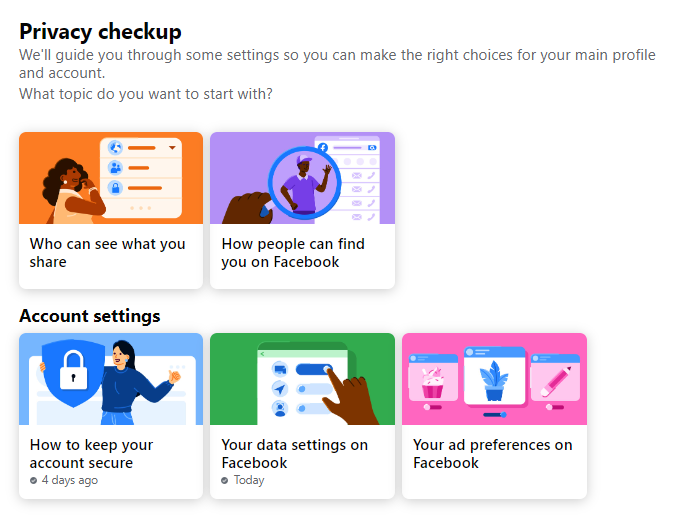
Never Share Personal Info
Keeping sensitive details such as addresses, email, phone numbers, and financial information private on Facebook prevents identity theft, data leaks, and stalking, ensuring your online and offline safety.
Block and Report Unwanted Content & Users:
Utilizing Facebook's tools to block and report unwanted content and users helps create a safer online environment, shielding you from harassment, scams, and inappropriate interactions while maintaining a positive social media experience.
To do so, just tap on "More" next to the post, video, or profile, and then you can select "Block" or "Report."
Bonus: Is Facebook Safe for Kids
Children on Facebook also face significant risks. Although the share of teens who used Facebook dropped in recent years, this social media is still in the top five popular apps list among teens.
Hence, this app's safety is also worth attention for parents. By using Facebook, it may put your children in danger below:
- Exposure to Inappropriate Content: There are tons of age-inappropriate material children can encounter through Facebook Feeds, videos, and ads, such as violence or explicit content, affecting their emotional and physical development.
- Join Harmful Groups: Involvement in harmful communities can expose kids to dangerous ideologies or activities.
- Get Facebook Addiction: Excessive use can lead to dependency, affecting school performance and social interactions.
- Be Cyberbullied: Online harassment via comments and direct messages can cause psychological distress and affect self-esteem.
- Easy to Access Strangers: Interacting with unknown individuals poses risks of exploitation or grooming.
- No Parental Controls: The absent parental control settings make it difficult to keep your kids away from the above dangers associated with Facebook.
Thankfully, many third-party parental control apps provide extra protection on your child's Facebook and other social media. And AirDroid Parental Control is one.
With it, you can receive alerts whenever your kids use a search or browse feature to find prohibited material or need assistance, thus guiding them to develop a healthy, positive view of that content. Anyway, AirDroid gives a sense of security. Try it free to see how it can help.
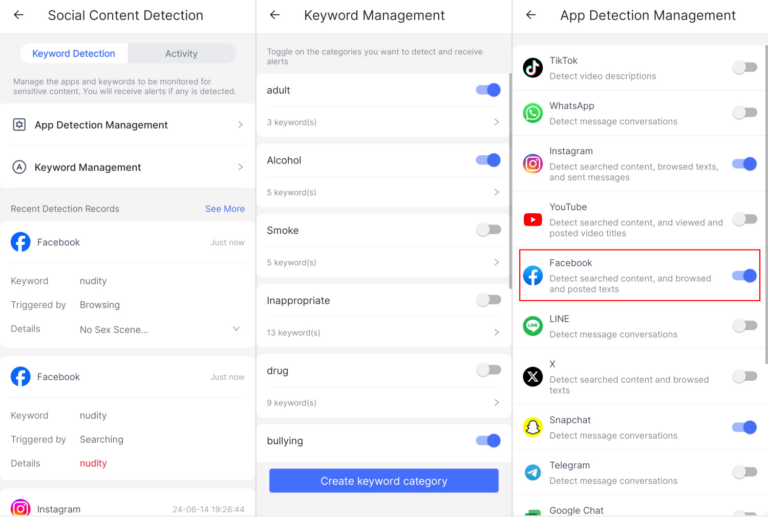
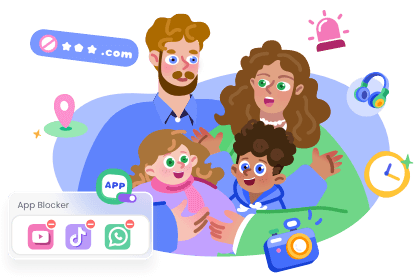





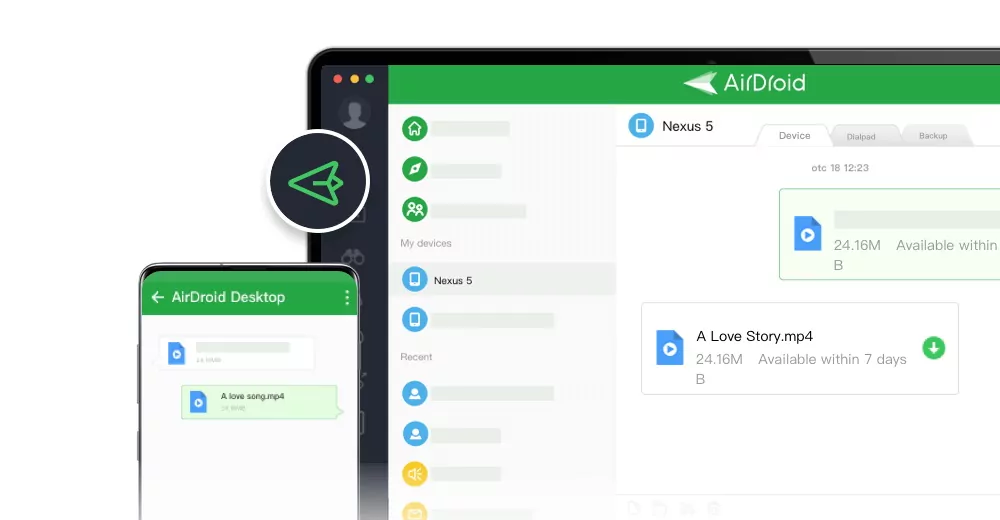




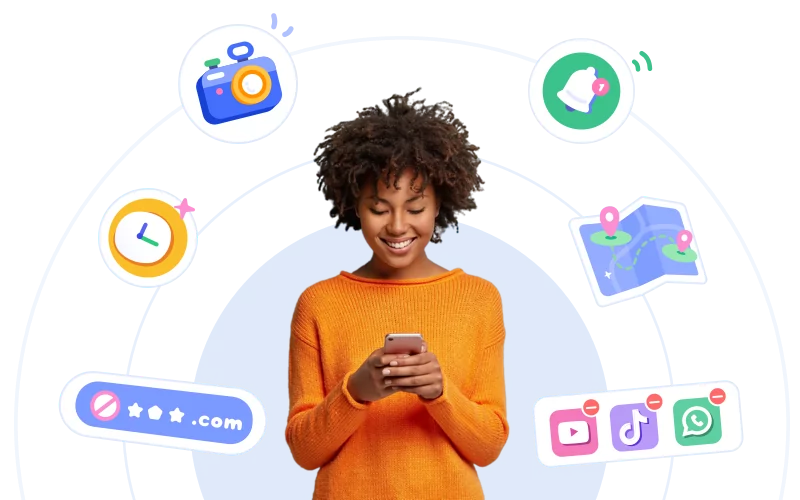
Leave a Reply.